Learn more about Mechanics:
AbbreviationsCapitalizationCompound Words: Everything You Need to KnowContractionsSpellingWhat is the difference between 'allusion' and 'illusion'?

The words allusion and illusion are often confused because of their similar spelling. Do you know the difference?
Illusion means anything that seems to be something that it is not when used as a noun.
Allusion means an indirect reference; a hint; a reference to something supposed to be known, but not explicitly mentioned; a covert indication when used as a noun.
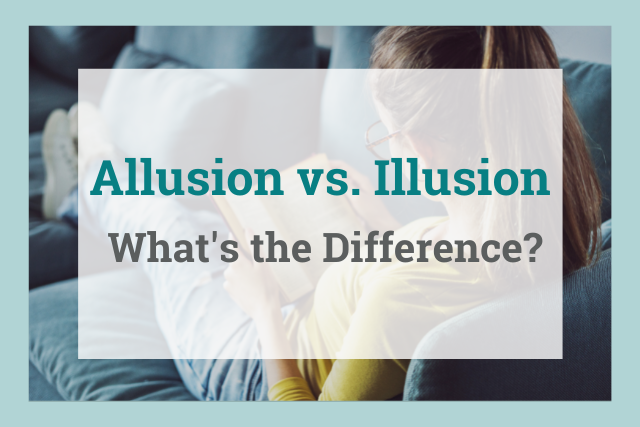
Allusion and illusion are two words that confuse many people, especially English language learners. But even seasoned writers might wonder which is the right word to use. This is understandable because they both sound similar, and their spelling is almost the same.
But what do the two words mean? What are their differences, and how do you use them correctly in your essays, blogs, or other forms of writing? For answers to these questions and more, keep reading.
What Is the Definition of Allusion?
If you make an allusion to something, you make a casual reference to a thing, person, idea or place. The reference is usually indirect, meant to make you think of something without actually mentioning it.
For example, if we say "pastries are my Kryptonite," we’re referring to the Superman comics without actually mentioning them explicitly.
Allusion (without the "an"), is also the name of a literary device. It means the same thing—an indirect reference to something—but in literature, an allusion specifically helps to inspire ideas or associations in the reader’s mind. In a book an author could make an allusion to something that happened in a novel he wrote previously.
In the above case, the author assumes the reader has read his previous work and understands the reference.
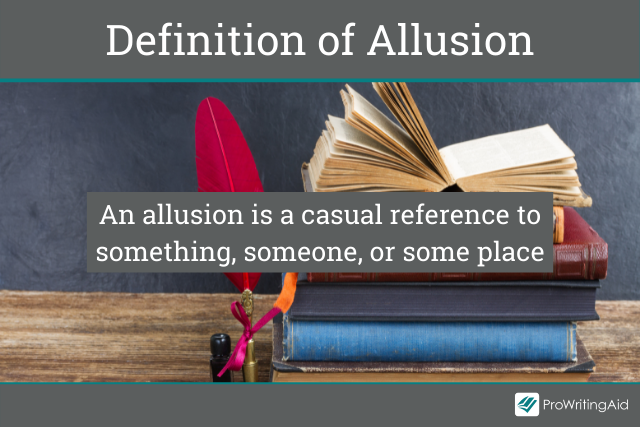
What Kind of Word Is Allusion?
Allusion is a noun—it is the name of a technique or a kind of expression.
The verb form of the word allusion is to allude. If you want to talk about the action of making an allusion, use "allude:"
She alluded briefly to the controversy at last year’s conference.
I will allude to her achievements in my speech.
I am alluding to the incident that occurred last week.
What Are Some Examples of Allusion?
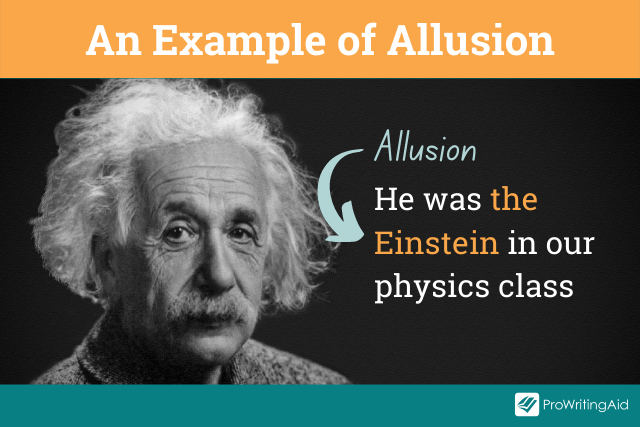
When used in a sentence, an allusion can be a passing reference or a way to bring something to mind without mentioning it directly. Here are some allusion examples:
- He was the Einstein in our physics class. (In reference to Albert Einstein)
- Josh had a Cheshire Cat grin on his face. (In reference to Alice in Wonderland)
- She kept mentioning he who must not be named. (In reference to the Harry Potter series)
- Their garden is a veritable Eden. (In reference to the Bible)
- Stop being such a Scrooge! (In reference to A Christmas Carol)
- I warned her to get back before midnight, lest her ride home turned into a pumpkin. (In reference to the fairy tale Cinderella)
We also make many allusions to classical mythology in our daily speech. Here are some examples of allusions to mythology:
- It took Herculean effort to complete the task. (the strength of Hercules)
- An arrow of love struck his heart the moment he laid eyes on her. (Cupid’s bow)
- Once they learned the enemy’s Achilles’ heel, the battle was halfway won. (Achilles’ weakness)
- He carried the weight of the world on his shoulders. (like Atlas)
What Does Allusion Mean in Writing?
Allusion is a type of literary device. Writers use allusions to create associations to renowned works, develop characters, or frame storylines.
By using allusion, authors can create a feeling, locate their work in a time period or culture, or introduce information in just a few words by playing on something that their reader is already familiar with. This helps the reader to understand the characters’ motivations or the events in the story within their own frame of reference.
Allusions are often used in literature to reference fairy tales, the Bible, Shakespeare, and popular culture.
As a stylistic device, it helps to put context into a story by referencing other literary works, places, events, or famous people. In most cases, the references are not explicit, leaving readers to figure things out on their own.
Writers could use it to enhance an idea, or they could use it ironically to compare something with another one that’s not quite similar. In most cases, the writer assumes that the reader has read the work (or know the person, place or thing) they are alluding to and will understand the reference. However, sometimes writers deliberately use obscure allusions to make a comment about the type of reader they are writing for.
A good example is T. S. Eliot, a writer known for his deliberate use of obscure allusions that few readers easily relate to.
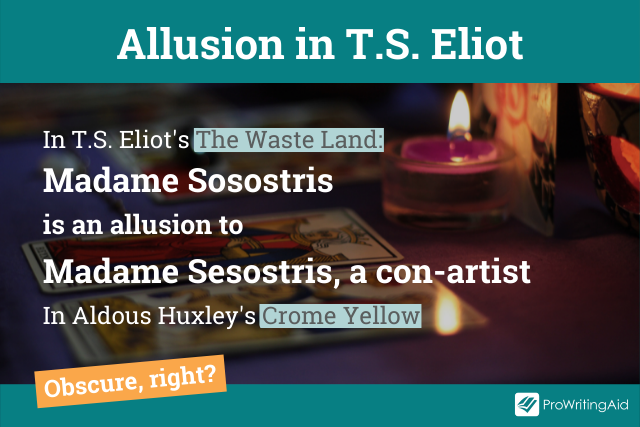
What Is the Definition of Illusion?
An illusion is anything that appears to be something other than what it really is. It’s an incorrect or wrongly interpreted perception of a thing, a sensory stimulus, or an experience.
It could also be a misleading appearance or notion—a misconception, false belief, false idea, or something that’s not real. Thus, a magician’s trick, such as pulling a rabbit out of a hat, is an illusion. Mirages are optical illusions.
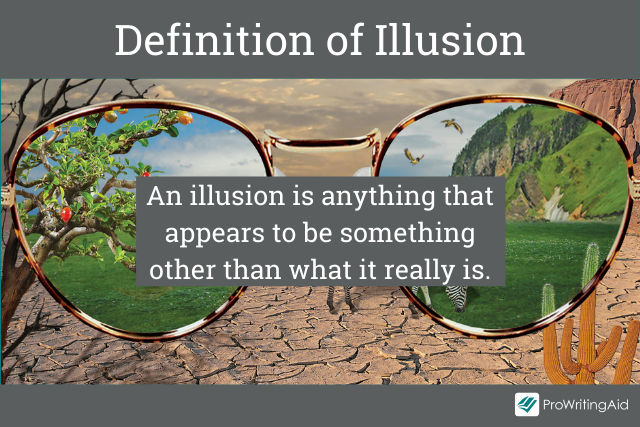
How Do You Use Illusion in a Sentence?
In most cases, an illusion implies the use of a trick either in action or appearance. Below are five examples showing how you can use illusion in a sentence:
- The adventurers spotted a lake in the desert but it was just an illusion.
(This particular illusion is also known as a mirage. When the heat produces a mirror like effect that resembles a mass of water.)
- Mara’s power was just an illusion: the department was in control all along.
- If you have a small living room, adding mirrors can help give the illusion of a much larger space.
- Despite buying her a fancy ring, she had no illusions that he would marry her since he had done the same to many others before.
- The viewers gasped as the magician cut the lady into two halves, but it was merely an illusion.
What Does "To Have No Illusions" Mean?
Let’s take a closer look at that fourth example:
- Even though he bought her a fancy ring, she had no illusions that he would marry her since he had done the same to many others before.
If you have no illusions about something, it means that you see the truth of a situation even though there is the potential for you to be misled.
- I can’t come to the party. I have no illusions about how much my new boss expects of me—I’ll be at work until at least 9pm.
Here you can see that this phrase is often used when referring to something that we would like to be true (e.g. that your workload will be light and you’ll make it to the party) but that we know is not.
What Is the Difference Between Allusion and Illusion?
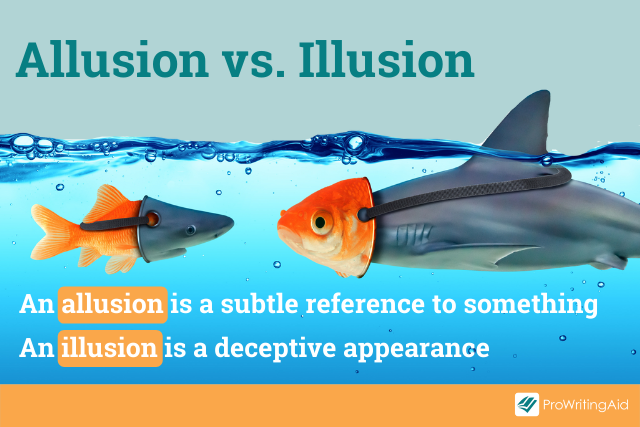
One way to figure out how to use allusion vs illusion is to try using both words in a sentence, like in this example:
- When asked how he usually pulled off his magic tricks, the magician replied they were not tricks but illusions, an allusion to Arrested Development, his favorite show.
Can you tell the meaning of the nouns allusion vs. illusion from the above example? The sentence illustrates the difference between the two words; allusion refers to a subtle reference to something, while illusion means a deceptive appearance.
Let’s take an example of each term separately:
- The teacher’s allusions to TV shows and pop songs popular in his youth left the students feeling a little lost.
- Sadly it wasn’t an illusion, her list of chores really was that long.
How Do You Remember the Difference Between Allusion and Illusion?
It’s easy to mix up these commonly confused words, especially when writing. But when you consider the context in which they are used, their differences become clearer. Fortunately, there’s a simple technique you can use to distinguish between the two. Here it is:
Allusion
Try to replace the term allusion with reference in your sentence. If it makes sense, then you have used the word allusion correctly. For instance: The poet made references to his previous works of poetry in the latest book.
Illusion
If you think of an illusion as a trick, you can use the phrase "trick of the eye" to help you recall that the word starts with the letter i.
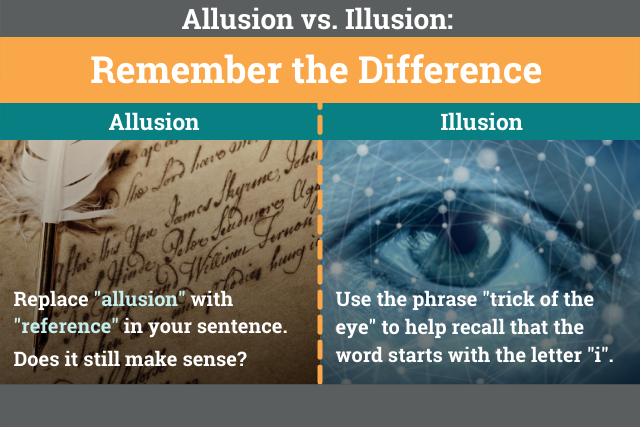
If you’re worried you’ll still mix the two words up—it happens to the best of us!—try ProWritingAid.
If you used illusion where you should have used allusion, you can fix it with a click:
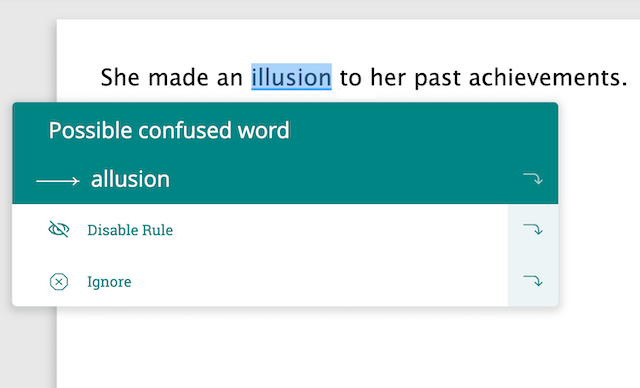
Check your word choice wherever you write with our browser extension. It’s free!
Is It "Illusions of Grandeur" or "Delusions of Grandeur"?
The phrase you’re looking for is "delusions of grandeur." Here’s why.
Illusion and delusion are words that are also easy to confuse. Not only do they rhyme, but their meanings are pretty close. But while they might appear similar, they do have different definitions.
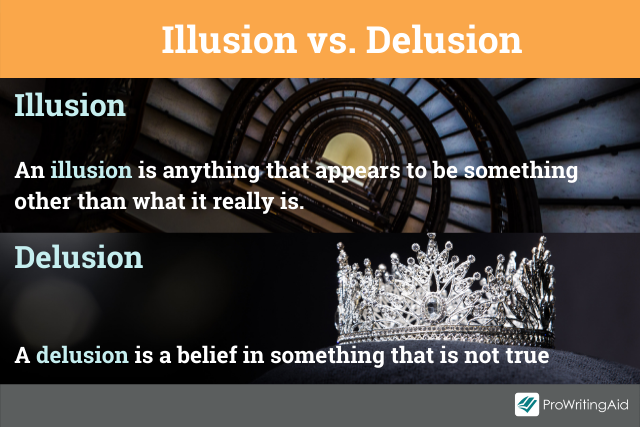
So, how are the two words different? Illusions are concepts or images formed by the mind, but they have no objective reality. In other words, a person ascribes a false reality based on what they see or imagine.
On the other hand, delusions are ideas or notions not based on reality. They result from a disorderly mind whereby a person cannot distinguish between what’s real and what seems real.
Delusions are therefore dangerous misconceptions that can mislead a person’s thoughts negatively. This makes them more serious than illusions.
Here are some examples showing how to use delusion:
- After his impeachment, the prime minister continued to suffer under the delusion that he still had power and authority.
- Some people have delusions of grandeur whenever they take drugs.
Is It Illusion or Allusion?
At this point, it’s probably safe to say that you understand the differences between these commonly confused words and when to use each of them in writing and speech. But here is a quick reminder:
- An allusion is an implied or indirect reference to a thing, place, idea, or person. The most common places to find allusions are in music, books, movies, and TV shows.
- In contrast, an illusion is something deceptive to the senses. It creates a false impression or perception of reality. In most cases, it entails a visual impression or optical illusion, like a magic trick.
Although allusion and illusion look similar, they have different meanings, as we have seen from their definitions and usage. Misusing either word could confuse your readers—or give the illusion that you are a sloppy writer. Make sure you choose the right word every time by following the tips in this article—or just download the ProWritingAid browser extension.
Take your writing to the next level:
20 Editing Tips from Professional Writers
Whether you are writing a novel, essay, article, or email, good writing is an essential part of communicating your ideas.
This guide contains the 20 most important writing tips and techniques from a wide range of professional writers
Examples of allusion in a sentence
Allusion to the biblical story of Cain and Abel (see Genesis 4:3-7).- Walden and on the Duty of Civil Disobedience by Henry David Thoreau
Uh, perhaps the allusion falters with second thought ... and worse with third.- A Malazan Book of the Fallen Collection 2 by Steven Erikson
Perhaps an allusion to the opulence of Indian costumes.- The collected poems of Emily Dickinson by Emily Dickinson; Rachel Wetzsteon
The allusion might be obscure to one of his age.- Hearing secret harmonies by Anthony Powell
Any allusion made to his father by a fellow or by a master put his calm to rout in a moment.- A Portrait of the Artist as a Young Man by James Joyce
Examples of illusion in a sentence
And as the sun rises, and Christ moves off toward the horizon, the sand burns with illusion.- A Graveyard for Lunatics: Another Tale of Two Cities by Ray Bradbury
Kaspar replied, ‘I appreciate the illusion that we have a choice in the matter.’- Exile's Return by Raymond E. Feist
Illusion, Paul realized.- The wandering fire by Guy Gavriel Kay
And then, suddenly, illusion fled.- Three Blind Mice by Agatha Christie
It wasn’t an illusion, she was clearly calling to him.- Villain by Shūichi Yoshida; Philip Gabriel










